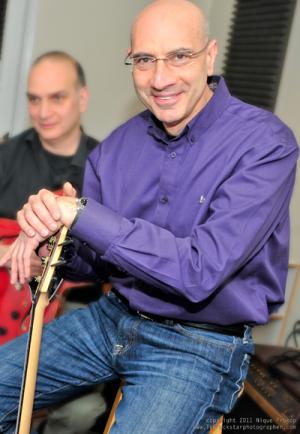The In-Laws: Further Thoughts on the "Poor Man's" Copyright and Solid Proof

So everyone in 2012 is an expert.
Recently, I was speaking on a panel concerning music-business trends in 2012 (Easy: The record industry is slowly shutting down, the music business is fine). Then the subject turned to the issue I thought we'd covered ad nauseam: The “poor man’s" anything.
The very subject of my last blog post was the abject nonsense of sending yourself a disc, a sound file, a cassette, an eight-track, a hard drive, a thumb drive or a pastrami sandwich that contained songs you have recorded as a composer.
A question from the audience occurred after I said this concept of sending material to yourself was “national nonsense,” perpetrated in some misguided capacity to beat “the man” (“the man” being the nice people at the copyright office).
The questioner wanted to know “Why?” -- since all these people (who had raised their hands when asked if they had some belief in this urban/suburban/rural myth) thought it had some essence of viability. The questioner said he had spoken to an expert, and the expert said it was solid proof at trial.
Did he mean “solid proof” in that incredibly expensive copyright infringement action you would eventually bring against some famous artist who made a vast fortune from your work, and who you felt had “stolen” your composition?
Is he talking about that case that would barely survive the various motions to dismiss and summary judgment? The one-in-a-million case that would actually proceed to trial after four years?
Get The Pick Newsletter
All the latest guitar news, interviews, lessons, reviews, deals and more, direct to your inbox!
Yes, that one.
The “proof” here would be that you had sent an envelope to yourself at some time. What was in the envelope? What was recorded on the sound carrier? Who composed which portion of the lyrics or music?
Never mind those details. Never mind that proving access is the real hurdle in a copyright infringement action. What apparently counts is that an expert had rendered the opinion.
This, then, led to an even sillier question I asked, concerning sending a T-shirt with your band’s name printed on it to yourself: “Is this a ‘poor man’s trademark’”? The answer was the same: An expert had said it showed usage of the band’s name. Well, there you have it!
Please help the U.S. Postal Service out of their fiscal doldrums by sending yourself every possible item you can think to prove your ownership; you may want to start with a picture of the Brooklyn Bridge.
Prior to forming Bienstock & Michael, P.C. 25 years ago, Ronald S. Bienstock was editor-in-chief and publisher of International Musician & Recording World and served as General Counsel to Hoshino, U.S.A. (manufacturer of Ibanez Guitars, electronics and Tama drums). In 1991, Ron was voted one of the top 100 "Most Influential People In The Music Business" by BAM Magazine. Bienstock & Michael’s practice serves a broad spectrum of clients throughout the entertainment and musical instrument industries, specializing in the fields of intellectual property, business matters and litigation. Ron teaches Entertainment Law as an adjunct professor at New York University and is a frequent guest lecturer for graduate and undergraduate schools at NYU. Ron has been a music business commentator for NPR, WBAI, Barely Legal Radio, Tech TV and CNN. He has been a guest lecturer, instructor and panel moderator for BMI, ASCAP, CMJ, NEMO, SXSW, NAMM, PMA, RPMDA, the Florida Music Conference, Miami Music Conference, Atlantic Records’ A&R University, the New York State Bar Association (NYSBA), the New Jersey State Bar Association, The Benjamin Cardozo School of Law, St. John’s School of Law, Rutgers School of Law, Seton Hall Law School, Ithaca College and other organizations and universities.
Photo: Nique Prokop
“The musicians, shops, and brands who use Reverb have always been at the center of all that we do”: Reverb has been acquired by two new investors – and will once again become an independently operated company
One of the UK's biggest guitar stores has sold its stock and website to online retailer Gear4music for $3.2 million – after weeks of speculation over its future




![[from left] George Harrison with his Gretsch Country Gentleman, Norman Harris of Norman's Rare Guitars holds a gold-top Les Paul, John Fogerty with his legendary 1969 Rickenbacker](https://cdn.mos.cms.futurecdn.net/TuH3nuhn9etqjdn5sy4ntW.jpg)





